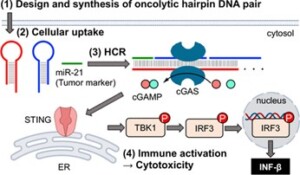A recent publication in the Journal of the American Chemical Society describes a new trial using a cancer-targeting artificial DNA to target cancer cells for destruction by the immune system.
The research team from Japan introduce a hairpin DNA assembly technology that enables cancer-selective immune activation to induce cytotoxicity.
How the cancer-targeting artificial DNA works
The hairpin DNA´s mechanism of action is based on cancer cells´ ability to overexpress certain DNA or RNA molecules leading to abnormal functions. The DNA created by the scientists reacts to a specific miRNA (miR-12) overexpressed in various types of cancer cells. The designed artificial DNA hairpins assemble into long nicked double-stranded DNA and bind to the miR-12 molecule. These combined structures are recognized by the innate immune system, causing an immune response and targeted elimination of the cancer cells.
The products from the hairpin DNA assembly selectively kill miR-21-abundant cancer cells in vitro and in vivo, based on innate immune activation. The method was effective in laboratory tests against human cervical cancer and breast cancer-derived cells as well as malignant melanoma cells in mice.
Implications of the new approach
The results of this study are good news for doctors, drug discovery researchers and cancer patients. This approach is the first to allow selective oncolysis derived from intracellular DNA self-assembly, providing a powerful therapeutic modality to treat cancer. It will give new options for drug development and medication policies that may be effective against cancers that have been untreatable until now.
Sources:
Morihiro K. et al. Oncolytic Hairpin DNA Pair: Selective Cytotoxic Inducer through MicroRNA-Triggered DNA Self-Assembly. J Am Chem Soc December 20, 2022. DOI: 10.1021/jacs.2c08974
Researchers Develop Artificial DNA That Kills Cancer Cells. Inside Precision Medicine. December 22, 2022
See also:
Precision Therapy of Cancer: A New Platform
Cancer Cells Targeted by CRISPR
Go to the News Board
